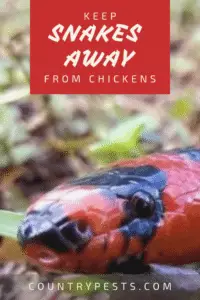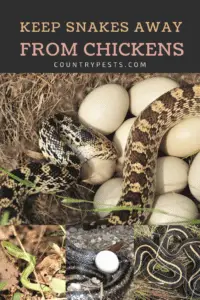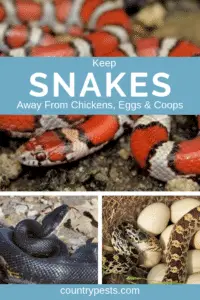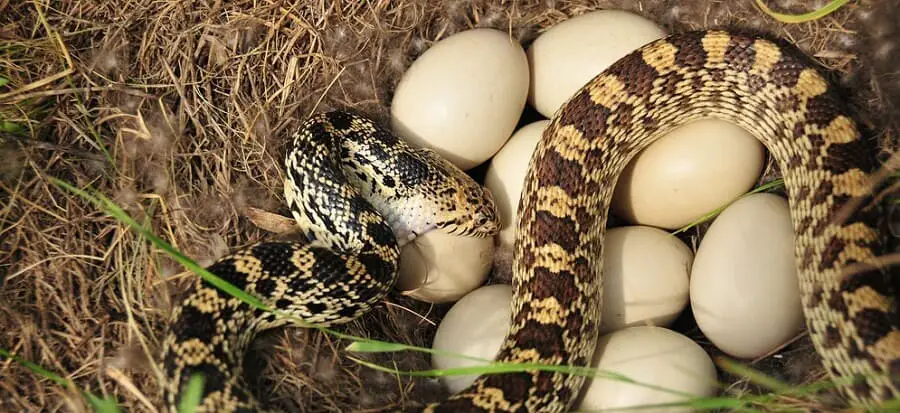Few things are as frightening as a snake in the chicken coop. You might want to kill and get rid of all snakes in the area, but snakes bring a lot of benefits with them. So how do you keep snakes out of your chicken cook and your chickens safe and still reap those benefits?
Let’s discuss:
How Can I Keep Snakes Away From My Chickens? Snakes can be kept away from chickens through three methods. First, eliminate all attractions to the chicken coop. Second, take precautions to keep snakes away from the coop without endangering your chickens. Third, use natural repellents to encourage snakes away.
The specifics of how you can accomplish this will vary, depending on your specific circumstances.
It’s important to be aware that eliminating snakes from your property can cause other issues. Snakes eat a lot of rodents and often non-venomous snakes eat poisonous snakes. Plus, snakes are protected from indiscriminate killings. Killing snakes around your property can cause more issues than it solves.
Did you know?
Only about 5% of wild snakes are poisonous. Most likely, the snake you found on your property isn’t going to hurt you and it may be controlling poisonous snake and rodent populations.
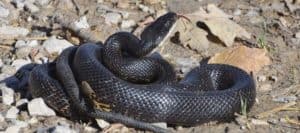
Eliminate Snake Attraction To The Chicken Coop
Snakes are not usually attracted to a chicken coop because of the chickens. But, once they find delicious, easy food in the form of chicken eggs, it is hard to resist. I’m not sure they want to resist at all- would you?
Instead, snakes usually find a chicken coop because they are following mice, rats, and other rodents when they happen upon your chicken eggs. They find it because they are hiding in grass and bushes and happen upon it.
The first thing you do is to start making your chicken coop less attractive and less likely to invite snakes into it.
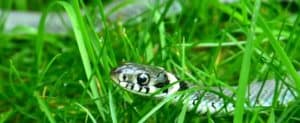
Cut Grass, Move Debris Piles, And Trim Back Bushes
First, create a snake-death zone around your chicken coop. That doesn’t mean that all snakes will automatically die or that you spread poison everywhere.
Instead, create an area that makes it more dangerous for snakes to reach the coop. You do this by keeping all grass short in a large swath around the coop. You can also take steps to keep snakes out of your yard as well.
If you have bushes that come up to your coop or fence line, cut them back or remove them.
Move neighboring woodpiles, debris and other items that create a place for predators to hide. Snakes love anything that provides them shelter.
All of these make the perfect hideout for snakes to reach the coop.
When you clear a large area around your coop, it eliminates a way for snakes to get to the coop safely. It makes them easily spotted by snake predators such as eagles, hawks, and owls. It makes the snakes more likely to be caught and eaten before they ever get to the coop.
Snakes don’t like being out in the open so they are less likely to wander out of other bushes and grass into an open area where they are vulnerable.
Be aware of any neighboring trees.
Why?
Most snakes can climb trees. Branches that hang over your chicken coop are a great way for snakes to gain access from the top. Trim back overhanging branches or anything else that could allow a snake to climb into the coop.
- Keep a wide area around the coop cleaned up of debris, wood piles, compost and other “hideouts” for snakes
- Trim back bushes and keep lawn or weeds mowed short so that snakes are in the open if they venture to the coop
- Cut back branches and other overhanging items that snakes can climb up and drop into the coop from above
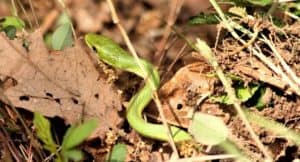
Clean Up The Rodent Population To Stop Attracting Snakes To Your Coop
Snakes usually don’t find a chicken coop because of the eggs, although they aren’t opposed to eating vulnerable chicken eggs. They usually stumble upon the coop while following the rodents. Rats and mice, and other rodents love to feast on the fallen chicken feed and drink from the water dishes.
They hide well in walls, cracks, and holes around a chicken coop. Once the snakes follow the mice in and find chicken eggs, they will continue to return.
Get your rodent population under control. Seal up holes and set traps where your chickens won’t reach them. Set traps at night and collect them before you let your chickens out.
Be careful about poisoning mice in case your chickens consume a sick or dead mouse.
Restrict access to your chicken food by putting the food away at night. You could also feed your chickens out where they free range during the day, but that doesn’t train them to come in at night.
Another option is to use a treble feeder or a bucket feeder. Both types of feeders are designed to restrict access to rodents and minimize spills.
- Trap rats and mice
- Put away chicken feed at night when mice run most rampant
- Use a treble feeder or a bucket feeder to minimize spills and reduce rodent access
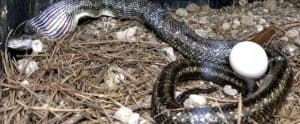
Regularly Collect Chicken Eggs To Protect Them From Snakes
Collect your chicken eggs promptly and daily. Don’t leave temptation out there unless you are raising chicks and have a brooding chicken.
Even then, collect all the eggs you aren’t hoping to hatch to reduce the temptation for any neighboring snakes.
Snake Proof Your Chicken Coop.
The next important step you can take is to make it difficult or impossible for snakes to enter your chicken coop. This is especially important if you have already lost chicken eggs because the snakes are likely to return.
By snake proofing your chicken coop, you ensure that even if snakes make it to the coop, your chicks and eggs will be safe.
1. Raise The Floor Of The Coop
Snakes will follow rodent burrows into your chicken coop. Raising the floor of the coop helps to prevent access.
Mice, voles, and rats will burrow under the coop to reach chicken feed or shelter. Weasels, minks, and other predators will dig holes or take advantage of existing holes to access your chickens.
When the floor is raised, even by a few inches, it keeps animals from digging into the coop. Make sure that the floor and walls are sealed without gaps or other access points. Repair all gaps or rotten wood.
- Raising the floor of your coop prevents burrowing animals to gain access to the coop
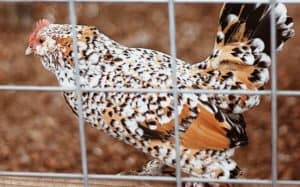
2. Add A Coop Apron
Another option to building a raised floor is to add a coop apron. This makes it hard for snakes to access your chickens.
It’s so simple. . .
A coop apron prevents other animals from digging into the coop. Use fencing or hardware cloth that is ½ inch fencing. Connect it to the bottom outside of your chicken coop by staple or screws. Bring the fencing out 20 inches from the coop along the ground. The fencing should sit flush to the ground.
You can cover the fencing with dirt, wood chips, or gravel to hid it.
The fencing prevents rodents and predators from digging to gain access to your chicken coop. Snakes don’t dig holes, to burrow, but they will comfortably access a mouse burrow or a weasel hole.
This allows you to provide a dirt floor for your chickens without the danger of animals getting in to harm them.
- A coop apron prevents access without requiring a raised floor
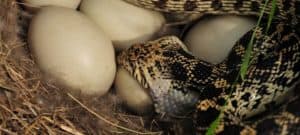
3. Hardware Cloth To Cover Holes and Gaps
Lastly, make sure you cover up all holes and gaps to make sure snakes can’t get in. Hardware cloth is ideal for covering vents, windows, and other holes. It is ideal as a covering for the fencing around the coop.
¼ inch hardware cloth is small enough to prevent snakes from getting in. Snakes can get into space the size of a quarter. They have an amazing ability to get through very small spaces. So, it’s important to check everywhere around your coop for holes.
Hardware cloth will prevent snakes, and other predators from getting in, but won’t kill them. That’s good because they will still help to eat the mice and other pest animals in the area.
Chicken wire by itself will not keep snakes out of your chicken coop. The holes are much too large. But, if you cover the chicken wire with hardware cloth, and bury it or make a coop apron, that will keep snakes out.
Another option is to use deer or bird netting. They are basically the same thing. It is a looser black netting than hardware cloth. It allows the snake to get through the netting, but then gets tangled around the snake.
Deer netting will ultimately kill the snake trying to get into your coop. But, it won’t be as effective keeping other predators out. Snakes eat weasels, another predator of your chickens.
- Hardware cloth is the most effective at keeping snakes and other predators out of your coop
- Deer or bird netting will kill snakes attempting to get in through a gap but isn’t as effective against other predators
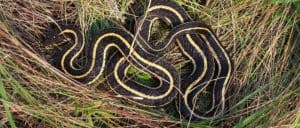
Rapel Snakes Through Scent To Stay Away
Plants Vegetation To Repel Snakes
Inside your chicken coop, but outside the chicken house, plant vegetation that repels snakes. Lemongrass and marigold are both plants that snakes don’t like.
Additional plants include garlic and onions because of their pungent odors. Rosemary, thyme, snakeroot have strong odors that snakes don’t like. It is also called rauwolfia serpentina or devil pepper.
Society garlic works well. It is also referred to as pink agapanthus and is in the onion family.
It’s important to understand that snakes smell through taste. They don’t smell well from a far away. So, planting smelly vegetation around the area adds another barrier of smell for snakes. It’s not going to rappel stakes 20 or 30 feet away. That’s what the other steps are for.
- Lemongrass, marigold, garlic, onion, rosemary, thyme, and snakeroot.
Commercial Snake Repellants
There are many commercial snake repellents on the market. Most of them contain high amounts of sulfur to keep snakes away.
The problem is that snakes aren’t usually bothered by sulfur. Studies done with snakes don’t show much if any adverse reaction from snakes when they encounter high levels of sulfur. The Humane Society states that most snake chemical killers and repellents don’t humanely kill snakes or keep them away.
But, there are a lot of people who use sulfur and claim that it does keep snakes away. If you decide to try a commercial product to keep snakes away, make sure you take other steps to secure your coop.
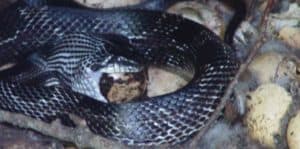
Bring In Animals That Keep Snakes Out Of The Chicken Coop
Snakes have several enemies. Surprisingly, one animal that fights snakes is guinea fowl. They hate snakes. They will attack, corner, and confront a snake in the coop. Guineas will occasionally kill a snake that won’t be intimidated away.
They do prefer to scare the snake away and aren’t afraid of it.
But,
Guinea fowl can be a bully in the flock. Some guineas owners have issues with guineas bullying and picking on their chickens. So be aware that the aggression of the guinea fowl can go both directions. Guinea fowl also eat a lot of rodents and are capable hunters of mice.
Cats are another animal that will kill snakes. Cats are very capable hunters and easily kill most snakes, as well as the rodents attracting them. But, your cat will need to be a friend of your birds or you will still have missing birds and chicks.
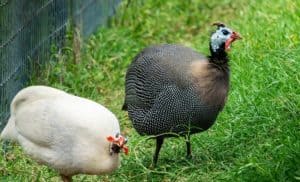
Will Mothballs Keep Snakes Away?
Mothballs are ineffective at keeping snakes away and they endanger your chickens. Moth Balls work by emitting fumes, or poison, into the air meant to kill small moths and other flying things in small spaces, But they do not work in wide open places and they are poisonous when consumed.
Even though the internet touts mothballs as being a magical cure for nearly everything. They are not. It would take a toxic amount of mothballs to affect a snake. Unless you put a solid “fence” of mothballs in the area, snakes could simply avoid the area and access the coop elsewhere.
The greater danger comes when your hens eat the mothballs. In several tests, 30% of chickens who consumed mothballs died or were severely ill. Others, who didn’t die, transferred the poison into their eggs.
This creates an issue for human consumption.
- Mothballs are needed in enclosed space
- Mothballs are poisonous for chickens
- Chickens that eat mothballs pass the poison on through their eggs or meat
- Mothballs are ineffective against snakes
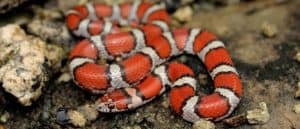
Can I Use Golf Balls To Trick My Snakes Into Staying Away From The Eggs?
Several home remedies suggest using golf balls as a means of confusing the snake and making it think that the eggs aren’t edible. But, there are several flaws with this idea. First, snakes do have a good sense of smell through taste. They are very likely to identify that a golf ball does not smell the same as a real egg. They are less likely to eat the golf ball.
Secondly, snakes who do eat golf balls are often able to regurgitate the golf ball up and go after a real egg or chick instead. Snakes regurgitate the parts of food that they aren’t able to digest. This includes egg shells, bones, and hair.
Third, if the snake can’t regurgitate the golf ball, then it will die a slow and painful death. This is cruel and unnecessary.
- Snakes can usually tell that a golf ball isn’t food
- Snakes can regurgitate golf balls
- A snake that eats a golf ball will die a painful death
Can I Trap Or Kill Snakes Eating My Chickens
Snakes are protected from indiscriminate killings. They are vital to a healthy ecosystem and they do help to control many other pests around your yard. You may be tempted to kill the snakes eating your chickens or you may kill them in a fit of anger, but in the long term, it is better to keep snakes away from the coop and let them help you in the yard and bushes.
There are many types of snake traps. Some kill the snakes, others, like the cone or funnel trap, humanely trap snakes. If you trap a live snake, make sure that you check carefully to make sure that it’s not poisonous before you handle it.
Minnow traps, also called funnel traps, are ideal as a safe means of trapping snakes. Put an egg in the trap and secure it with a clip. The snake can get in, but not out, which will allow you to relocate the snake.
Release the snake away from your chicken coop. Be aware that in most areas, you will need permission from the property owner to release the snake anywhere off of your property.
Avoid sticky and snap traps as they slowly and painfully kill the snakes that are trapped.

Can Snakes Kill Chickens?
Snakes most often kill chicks and eat the chicken eggs, but they can also kill adult chickens. Snakes aren’t able to digest an adult chicken but will kill it in an attempt to eat it or as a means to access the chickens. This happens when you have a protective hen.
To determine if a snake has killed your chickens, and not another predator, check your chickens head for saliva.
How Do I Know If A Snake Has Attacked My Chickens
There are several specific signs that a snake is eating your chicks or chicken eggs and not another predator. First, a snake will regurgitate the egg shells. If you find a pile of regurgitated chicken eggshells near your coop, that is a sure sign of a snake.
Secondly, snakes swallow their food whole. If one of your hens has a wet head, then a snake has attempted to swallow her. This can occur without killing the hen. A wet chick is another sign of a snake that attempted to eat.
Third, snakeskin in your chicken coop indicates a snake. Snakes shed their skins where they feel safer and a shed skin means the snake feels very safe in your coop.
Be aware that snake can also eat your chicken eggs or chicks and leave no clues behind. They simply disappear.
- Snakeskin left behind
- Regurgitated feathers or eggshells
- Wet chicks or wet heads on your hens
- A disappearance with no signs

What Kinds Of Snakes Eat Chickens?
In the United States, five types of snakes typically eat chicken eggs or baby chicks. Those snake varieties are rat snakes, king snakes, milk snakes, black snakes, and chicken snakes.
None of these most-common snakes found in chicken coops are poisonous to humans. Some of them may bite, but they don’t have venom.
- Black snakes are also water moccasins
- Their white chin may confuse them for a cottonmouth snake (very poisonous)
- King snakes imitate the coral snake (very poisonous)
- King snakes have vibrant colors and patterns
- Rat snakes eat a lot of rodents. Bite and suffocate rodents
- Milk Snake is a type of king snake and looks like a coral snake
- Chicken snake, or yellow rat snake, is nonvenomous
Feature image photo credit: USFWS Mountain-Prairie
[post-carousel id=”364″]
